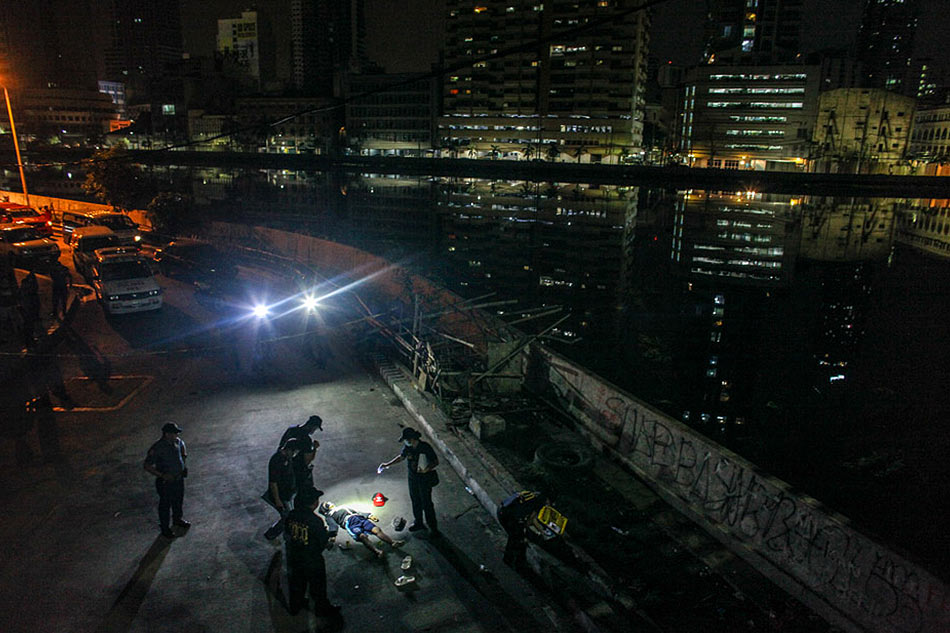Group urges 'humane' reporting of drug-related stories following lapses during 'drug war' era | ABS-CBN
ADVERTISEMENT

Welcome, Kapamilya! We use cookies to improve your browsing experience. Continuing to use this site means you agree to our use of cookies. Tell me more!
Group urges 'humane' reporting of drug-related stories following lapses during 'drug war' era
Group urges 'humane' reporting of drug-related stories following lapses during 'drug war' era
Jauhn Etienne Villaruel,
ABS-CBN News
Published Apr 21, 2023 02:55 PM PHT
MANILA -- A newly-formed network of advocates on Friday launched a 24-page "toolkit" to aid journalists and other media practitioners in reporting on drug-related stories following the supposed lapses during the height of the previous administration's "war on drugs."
MANILA -- A newly-formed network of advocates on Friday launched a 24-page "toolkit" to aid journalists and other media practitioners in reporting on drug-related stories following the supposed lapses during the height of the previous administration's "war on drugs."
Drug Policy Reform Initiative (DPRI) lead convener Kristine Mendoza said the media should have challenged the "narrative" of the Duterte administration that it was carrying out a "war on drugs."
Drug Policy Reform Initiative (DPRI) lead convener Kristine Mendoza said the media should have challenged the "narrative" of the Duterte administration that it was carrying out a "war on drugs."
"Why are you subscribing to the idea of drug war? That's propaganda. Hindi naman armed yung kalaban, hindi naman sila organized... It's not a war, it's murder," said Mendoza, a lawyer.
"Why are you subscribing to the idea of drug war? That's propaganda. Hindi naman armed yung kalaban, hindi naman sila organized... It's not a war, it's murder," said Mendoza, a lawyer.
Pulitzer-prize winning journalist Manuel Mogato also urged fellow media workers to "report beyond the numbers."
Pulitzer-prize winning journalist Manuel Mogato also urged fellow media workers to "report beyond the numbers."
ADVERTISEMENT
"Tayong journalist we should report beyond numbers kasi bawat isang buhay may kuwento yan. Sa ating pagsusulat, para maintindihan ng mamamayan, dapat relatable at relevant yung ating sinsusulat so importanteng bigyan natin ng mukha ang kuwento at hindi tayo laging nagde-depend lang sa storya o narrative ng police or ng ating gobyerno," he said.
"Tayong journalist we should report beyond numbers kasi bawat isang buhay may kuwento yan. Sa ating pagsusulat, para maintindihan ng mamamayan, dapat relatable at relevant yung ating sinsusulat so importanteng bigyan natin ng mukha ang kuwento at hindi tayo laging nagde-depend lang sa storya o narrative ng police or ng ating gobyerno," he said.
Based on the toolkit, labels such as "adik," "durugista," and "drug abuser" are considered "stigmatizing and harmful."
Based on the toolkit, labels such as "adik," "durugista," and "drug abuser" are considered "stigmatizing and harmful."
Instead, journalists are encouraged to use "persons who use drugs" or "persons whose lives include drugs" in order to "highlight that drug use does not define a person,” said Mendoza.
Instead, journalists are encouraged to use "persons who use drugs" or "persons whose lives include drugs" in order to "highlight that drug use does not define a person,” said Mendoza.
“We are proud to say that this is the first comprehensive media toolkit on drug reporting in the country written through the lens of harm reduction - an approach to drug use that shuns stigma, discrimination, and coercion,” said Mendoza.
“We are proud to say that this is the first comprehensive media toolkit on drug reporting in the country written through the lens of harm reduction - an approach to drug use that shuns stigma, discrimination, and coercion,” said Mendoza.
The full toolkit can be accessed through https://tinyurl.com/PuttingPersonsFirst.
The full toolkit can be accessed through https://tinyurl.com/PuttingPersonsFirst.
RELATED VIDEO
Read More:
Drug Policy Reform Initiative
DPRI
drugs
drug
war on drugs
drug war
media
media toolkit
coverage
ANC
ADVERTISEMENT
ADVERTISEMENT



